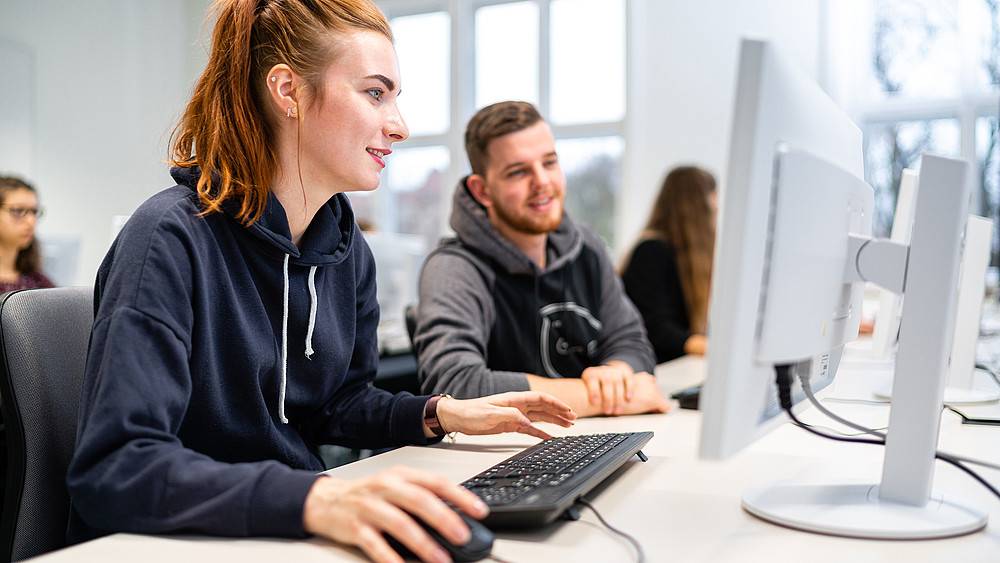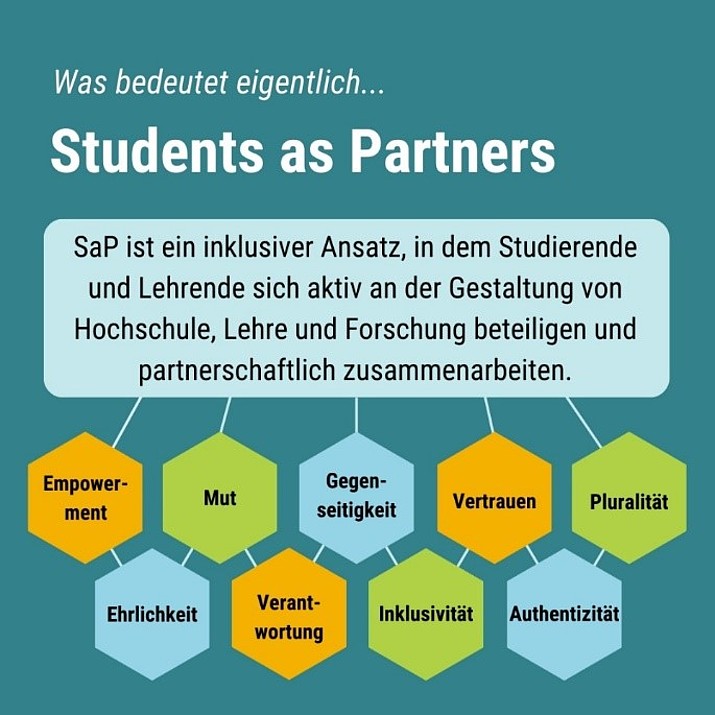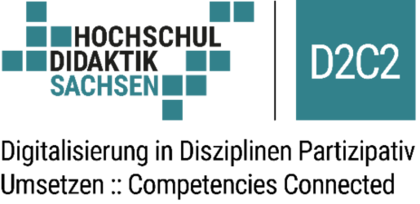Students actively support the digitalization of studies and teaching

Implementing digitalization in disciplines in a participatory way - Competencies Connected (D2C2) - is a joint project funded by the Foundation for Innovation in Higher Education in which the Zittau/Görlitz University of Applied Sciences is involved. Coordinated by Hochschuldidaktik Sachsen (HDS), the HSZG sub-project of the joint project is located at the Center for Knowledge Transfer and Education under the direction of the Vice-Rector for Education and International Affairs, Prof. Dr. Sophia Keil. The aim is evidence-based teaching development in the field of digital teaching, for which specialist networks for exchange are being established and teachers are being supported in the implementation of digital methods and tools. Further information on the joint project can be found on the HDS website.

In order to provide needs-based services to promote good teaching, the network's portfolio includes the following focal points:
D2C2 works according to the "Students as Partners" approach and actively incorporates the student perspective into the project work. This gives students the opportunity to participate in the design of subject-specific teaching, e.g. through surveys or active participation in teaching-learning scenarios, but also to develop their personal skills by working in multidisciplinary, cross-location teams and tackling a wide range of tasks relating to current issues in the context of digitalization.
Theresa L. (student partner, Faculty MK):
"I wanted to support the HSZG in improving teaching, which is why I'm involved in the project. Currently, my project work mainly involves researching approaches to promoting digital skills among students and providing feedback on existing formats from a student perspective. Artificial intelligence approaches in particular can support us students in our learning and make many tasks easier. In the project, I am helping to create micro-courses that are geared towards students acquiring skills. It's nice to see how my perspective is taken into account in order to improve teaching. I would also like to have more opportunities to get involved outside of the project. The student perspective on teaching and learning processes means that you are much closer to the students' wishes when designing the course. I can only recommend my fellow students to take the opportunity and get involved as a "student partner". This has many advantages: Not only do you often have the opportunity to earn money for your studies, but you also gain specialist input and insights into project work. For example, I was able to learn a lot about AI, its possibilities, functions and areas of application."
Christian B. (student partner, Faculty of EI):
"I wanted to broaden my horizons and saw working on this didactics project as a challenge. Having a positive influence on teaching for future generations of students motivated me to take part in the project and I found the cooperation on an equal footing and the opportunity to contribute personal ideas to the project to be extremely successful. Highlights for me were the project meetings of the Saxon network, where I was able to make contact with other departments and various perspectives on the project topic. The diversity of the individual focal points was interesting. The challenges of digitizing universities became clear to me and that there is no "one" solution. There are different teaching approaches from university to university and even within faculties. Higher education thrives on this diversity and it should be preserved. It has been shown time and again that the lecturers at the HSZG are very committed and interested in imparting knowledge beyond the courses. With regard to the opportunities to help shape studies and teaching, I would advise students to Ask questions! In the lecture or in the seminar...it doesn't matter. That's the easiest way to have a direct influence. As a former member of the study commission, I recommend that you become a member of the commission as a student representative if you are interested in the further development of teaching. In the course of the project, I have dealt with many digital tools and can well imagine applying this knowledge in the future in the age of advancing digitalization."
Esther P. (student partner, Faculty N)
"Digitalization is becoming more and more relevant, especially in everyday student life, be it researching something, working it out, etc.. That's why I'm interested in improving teaching concepts and I wanted to actively support the project. I am currently involved in the creation of electronic exercises for students. This gives me the opportunity to help design assessment tasks and thus contribute my perspective (the student perspective) and make learning easier for my fellow students because I know which topics still need an explanation in a different way or which are difficult to understand. A student explanation can help here. I'm pleased that there are projects like this where students can help shape teaching-learning processes. It is a benefit for both sides, teachers and students, to be able to exchange ideas and improve teaching. Teachers recognize which topics and/or concepts are not working and get new ideas from the students to improve them. I would therefore advise other students to take their opportunities to help shape study processes and in particular the module evaluations seriously and to offer constructive criticism in order to improve teaching."
Ferenc T. (student partner, Faculty of EI)
"I wanted to gain project experience in the field of digitalization/didactics and expand my range of experience beyond the engineering spectrum. The project gave me the opportunity to act as a link between students and professors/staff in order to positively influence teaching for subsequent years. The focus was on advising lecturers on teaching approaches (student perspective) as well as testing and implementing digital tools, which should not only support everyday work in teaching, but also make lessons more interesting and instructive. As part of the project work, I was able to meet a wide variety of people and gain insights into different subject areas. The insights I gained from working in a network of Saxon colleges/universities made it clear to me once again that the smaller student numbers at the HSZG in Zittau have many advantages for teaching. I was particularly impressed by the comparatively close contact between students and lecturers at the HSZG, who are highly committed to constantly optimizing their teaching. If my studies weren't already over, I would also like to support other areas with my student perspective."
Tina G. (student partner, Faculty N)
"I was motivated to become part of the project because I saw the opportunity to play an active role in shaping university teaching. At the beginning of the project, I took part in focus group interviews and helped to evaluate them. The aim was to identify support services for teaching staff. I am currently working on audio response systems to increase interaction between students and lecturers in the classroom. One challenge for me was the distributed collaboration with project staff from other universities. Due to the purely digital form of work, building a team spirit and getting to know staff from other universities is somewhat different than when everyone is always on site. One of my highlights is the digital exchange format supported by the project. Every two weeks, a teacher presents their teaching method and discusses the advantages and challenges of the method with colleagues and supports each other. This gives you an exciting insight behind the scenes of teaching at the university. In general, I like the personal aspect of our university. It's informal and the staff go to great lengths to adapt the courses to the students' needs as long as you communicate with them. Projects like D2C2 are an important cog in this structure. I would like to see such opportunities for participation expanded even further. It is very beneficial for teaching and therefore for the university if students are actively involved in shaping their own learning environment. However, this also requires a sufficient number of interested students, and the smaller a university is, the more difficult I find it to find motivated students who want to contribute to the further development of the university in addition to their lessons and leisure activities."
In addition to the many results that have already emerged from the project, the HSZG's current bundles of measures deal, for example, with...
On behalf of the Rectorate, Vice-Rector Prof. Dr. Sophia Keil would like to thank the student partners who have so actively supported the D2C2 project, as well as all those who have taken the opportunity to participate and transfer their knowledge by taking part in the project's accompanying offers in order to advance the digitalization of university teaching. In this way, it was possible to create an alliance of various experts that would hardly have been possible without such a network.
We are therefore pleased to announce that the project will be extended by one year until 31.12.2025 due to its successful work. You are cordially invited to participate in the services provided.
The Digital Teaching Exchange HSZG enters the next round in the summer semester 2024. The programme includes a wide range of exchange meetings on digital teaching formats, methods and tools, e-assessments, future skills as well as challenges and tips for the digitalization of studying and teaching. We look forward to lively discussions and are excited to hear the insights of our lecturers.
We cordially invite you to join us!
All dates of the exchange meetings, access to the online room and further information on methods, tools, good practices and events on the topic of digital teaching can be found here.

